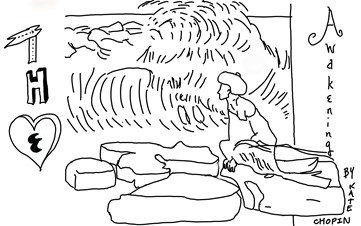Kate Chopin’s 19th-century novel, The Awakening, provides a compelling social commentary that still holds relevance in today’s world. Indeed, with its complex plotline and nuanced characterization, Chopin urges the readers to consider important themes such as social restrictions of gender norms to the process of self-realization.
The story revolves around Edna Pontellier, a housewife of a wealthy man, Mr. Leonce Pontellier, and a mother of two in her late 20s. She goes through the process of self-realization to explore her complex inner world. While vacationing on an island off New Orleans, she meets Madame Adele Ratignolle and Mademoiselle Reisz. They spark Edna’s process of ‘awakening’ or realizing her identity beyond what society has told her for her entire life. She also meets a young, charming man named Robert at the beach, whom she starts to spend time with. Especially when Edna is starting to realize her own emotions, and as Robert and Edna are becoming romantically interested in each other, Robert accelerates this awakening process by allowing her to explore her sexual desires, which were previously subdued by the social conditions of marriage. However, Robert, who feels morally wary of the fact that he is growing in love with a married woman, decides to suddenly leave for Mexico, upsetting Edna, who is deeply infatuated with Robert. With the help of Mademoiselle Reisz, Edna finally admits her true feelings for him, and she pursues her newfound sexual desires by having a short-lived affair with Alcee Arobin while her husband and children are away. However, when Robert comes back, they both confess their feelings and kiss, but Robert quickly leaves, as he is racked with the guilt of being in love with a married woman. Distraught, she drowns herself as she believes death is the ultimate freedom away from her societal pressures and unhappy marriage, the pinnacle of her ‘awakening.’
This novel brings forward numerous themes that still hold today. Firstly, the novel explores the social limitations on 19th-century women. In his discussion with Edna, Robert alludes to her husband’s property, a normalized status of women in 19th century America. These social conventions not only restricted women in their occupations or physical state, as they were mostly limited to being housewives, but it also pressed intellectual limitations on women by preventing them from thinking more of themselves or understanding their identity as anything beyond the social conventions of a housewife and a mother. Women, since birth, are discouraged from independent thoughts, and this intellectual captivity is a concept explored in this novel. Indeed, Edna’s ‘awakening’ is her process of breaking free from both intellectual/emotional and physical/occupational captivity. The plot notes that this process starts with intellectual/emotional freedom first. The awakening process starts with emotional realization and self-expression, catalyzed by Madame Ratignolle.
Furthermore, Edna discovers her strength and finds joy in individual creation, originating from her intellectual and emotional freedom. Most critically to the plot, she finds the ability to feel the emotion of love and sexual desires, towards Robert, as part of her self-realization. Edna contrasts her freed self with Adele, who has not found emotional and intellectual freedom to know that there is more in life yet, feeling happy in her marriage. Once Edna reached self-realization and found intellectual and emotional freedom, she acted towards this freedom towards physical and occupational freedom, pursuing her love with Robert. As her pursuit of the relationship with Robert fails, Edna seeks physical and occupational freedom as a product of her intellectual and emotional freedom as she drowns herself because she believes that is the only path to freedom.
By: Sooyoung Seo


